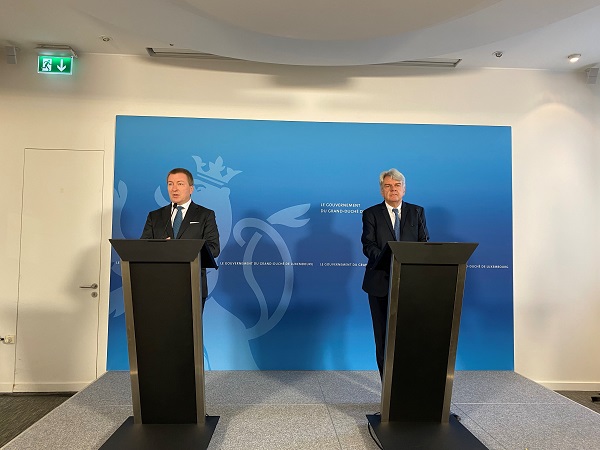 L-R: Marc Hansen, Luxembourg's Minister for the Civil Service; Romain Wolff, Federal President of CGFP;
Credit: MFP
L-R: Marc Hansen, Luxembourg's Minister for the Civil Service; Romain Wolff, Federal President of CGFP;
Credit: MFP
On Monday 17 October 2022, Marc Hansen, Luxembourg's Minister for the Civil Service, and Romain Wolff, Federal President of the CGFP civil service union, presented at a press conference the points on which the two parties granted concerning the operation and organisation of teleworking in the civil service.
This long-awaited initiative, provided for in the salary agreement of 4 March 2021, aims to allow a more uniform implementation of teleworking at the level of ministerial departments, State administrations and public establishments.
While as part of a pilot project in 2019, around 160 civil servants carried out part of their tasks via teleworking, the start of the COVID-19 pandemic in March 2020 accelerated this form of work, with thousands of civil servants switching from face-to-face work to teleworking in just a few days. To allow this massive deployment, the government had repealed the existing Grand Ducal regulation which proved to be too restrictive, especially in this pandemic situation, according to the Ministry of the Civil Service and the CGFP.
Teleworking was henceforth governed exclusively by article 19bis of the general status of civil servants of the State which provides that "the civil servant may be authorised by the head of administration to carry out part of his tasks at home by teleworking by using information technology. The head of administration determines the procedures for exercising telework".
The pilot project and the experiences accumulated since the start of the pandemic have fuelled reflections with a view to anchoring teleworking in our daily lives and giving it a set of appropriate rules.
This agreement on the operation and organisation of teleworking in the civil service recalls the voluntary nature of teleworking and insists on respect for equal treatment between civil servants who are teleworking and those who are performing their duties at their place of employment. In addition, it defines the teleworking authorisation procedure involving the staff member, his/her line manager and the head of administration, and determines the elements to be included in any teleworking authorisation. The right to disconnect, data protection and the duty of confidentiality, the protection of health and safety in teleworking as well as teleworking training are other elements covered by this agreement.
Minister Hansen welcomed the constructive talks that were able to take place during the various consultations with the representatives of the CGFP and expressed his satisfaction at the fact that the more precise supervision of teleworking constitutes a real asset for a substantial number of civil servants and will further promote the deployment of this form of work in ministerial departments, State administrations and public establishments.
Romain Wolff, for his part, made a point of emphasising that the new regulatory framework will finally provide the long-awaited solid basis for teleworking and will help the aforementioned bodies to implement this form of work in an accurate framework. He explicitly welcomed the fact that each administration wishing to set up a teleworking policy must identify within a defined period all the functions eligible for this form of work.








